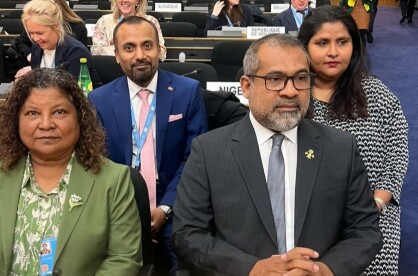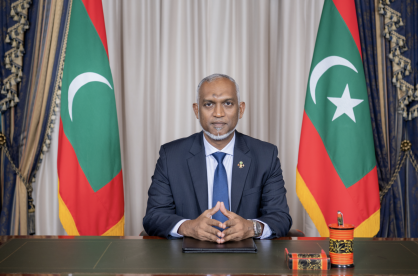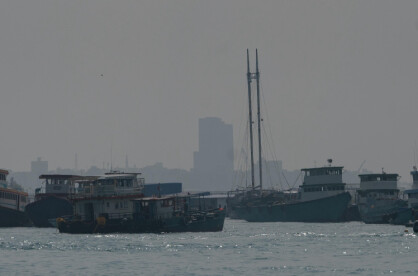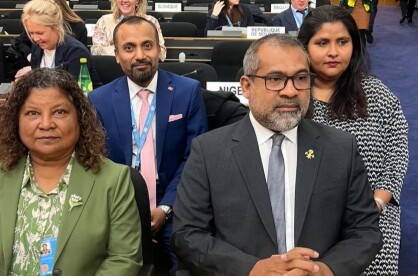During April of 2021 Speaker of Parliament Mohamed Nasheed once again expressed his desire, to President Ibrahim Mohamed Solih, towards shifting to a parliamentary system of governance in the Maldives. This debate echoes one from the early 2000s. In fact, in 2008, a constitutional referendum was held to decide whether the country should pursue a parliamentary system of government as opposed to a presidential system. Results showed majority support for the presidential system, which has continued to this day.
There are a variety of constitutional structures of national government throughout the world. Despite this variety, the most frequently noted distinction involve the Presidential versus the Parliamentary system.
The Presidential System
The presidential system is a form of government in which the president is the chief executive and is elected directly by the people. In this system all three branches – the Executive, Legislature, and Judiciary are constitutionally independent of each other, and no branch can dismiss or dissolve another. The President is responsible for enforcing laws, the legislature for making them, and the courts for judging. Each is given specific powers as a check and balance on the others.
The United States is seen as the originator and primary example of the presidential system. Some key features of the presidential system includes;
- Nominal and Real Executives: In a presidential system, the President is both the head of state and the government and there is no distinction between nominal and real executives as in a parliamentary system, where a distinction is made between the President or monarch and the Prime Minister.
- Principle of checks and balances: All the three organs of the government are separated from each other but keeping each other in check and restraining each other from any type of transgression of their power and functions.
- Superior position of President: the President is elected directly by the people, or by an electoral college, and occupies a superior position because all the powers of the government are concentrated with the president.
- Political homogeneity not necessary: It is not necessary that all cabinet members belong to the same political party.
Merits
- Stable government: the President is elected for a fixed tenure so this brings stability and efficiency in the administration
- Quick and decisive: The President is at liberty to either consult ministers, or not to, in the decision making process. This speeds up decision making, especially in emergencies.
- Separation of powers and checks & balances: This enhances the effective performance of each arm of government in its functions while checks and balances also ensures that a President, who by nature is seen as the key figure, can be brought under constitutional checks.
- Appointment of qualified people: It is in the best interest of the President to make appointments where experts with strong knowledge and experience take up portfolios to be delivered within set terms.
- Direct elections: The President is often elected directly by the people. This makes the President’s power more legitimate than that of a leader appointed indirectly.
Demerits
- Executive may become despotic: This system is prone towards dictatorial rule or abuse of office, which is dangerous to the democratic process. This is a result of the enormous power that is concentrated in the office of the President.
- Friction among government organs: Separation of powers can cause delays in the execution of government programmes, especially in situations where executive-legislature relations are not properly managed.
- Rigidity of the Constitution: Often this system lacks the flexibility required to cope with changing circumstances, bound by the Constitution
- The process of Lobbying can encourage Corruption: Although lobbying, if decently applied, can be an acceptable means by which pressure groups influence public policies; it is also open to abuse or misuse by a so motivated chief executive who is determined to have their ways at all costs.
Variations in Presidential Systems
Wide variations exist within the presidential forms of government around the world, found in different forms in both democratic and non-democratic nations. In non-democratic countries, political parties account for the adaptation of a presidential system, whereas in other countries, such as the case of France, the presidential system comes with elements of a parliamentary system. Countries such as the USA, Maldives, Zimbabwe, Philippines, South Sudan, Mexico, Iran and Bolivia currently have presidential systems.
The Parliamentary System
This is a democratic form of government in which the party (or a coalition of parties) with the greatest representation in the parliament (Legislature) forms the government (Executive), its leader becoming prime minister or chancellor. The parliamentary system originated in Britain and has been adopted in several of its former colonies.
Some key features of the parliamentary system includes;
- Supremacy of its legislative branch: The legislative branch conducts its business through a unicameral (one house) or bicameral (two houses) Parliament. This group is composed of representatives or members that are elected by citizens. The primary job of members of Parliament is to create and pass laws
- Divide between the roles of Head of Government and Head of State: Members of Parliament appoint the Prime Minister, who is the Head of Government. The Prime Minister oversees Parliament. This creates an overlap between the legislative and executive branches of government. The Head of State in a parliamentary system is largely symbolic.
- Formation of Cabinet: the Prime Minister nominates a council of ministers or their cabinet.
- Coordination of powers: It is the basic principle of this system that two organs, legislature and executive share their powers. In this system, both organs are dependent upon each other.
- Political collective responsibility: The cabinet is collectively responsible before the legislature. Activities of the cabinet can be questioned and checked by the legislature through various constitutional checks and balances. Ministers remain in office as long as they enjoy confidence in legislature.
Merits
- Harmony between executive and legislature: As ministers belong to the ruling party or parties enjoying a majority in the legislature, they do not face much difficulty in getting the support and approval of the legislature for the policies and programmes of the government.
- Quickly implemented decisions: With the legislative and executive arms working together there are minimal hurdles for implementing policies, etc.
- Educational value: The policies and programmes of the government as well as various problems facing citizens are discussed on the floor of the legislature through speeches as well as in question and answer sessions. The ministers, being members of the legislature, have to respond to the issues raised by members.
- Promotes good governance: This is because the individual and collective responsibility of the executive to the parliament will make all members of the cabinet work for the successful administration of the country. This also ensures accountability and transparency.
Demerits
- Weak separation of powers: The principle of separation of powers does not hold. Ministers are the members of the ruling party or coalition through wich they dominate policy-making though, in principle, policy-making is the domain of the legislature.
- Cabinet dictatorship: The Council of Ministers, with the support of the house majority, unchecked, can tend to be authoritarian and irresponsible. Being assured of the support of the majority, the executive may not care for the feelings and views of the opposition and minorities.
- Partisanship: Political parties are guided more by partisan motives than by national or people’s interests. While the ruling party seldom sees any merit in the criticism of the opposition, the opposition often opposes the government for the sake of opposition.
- Uncertainty and instability in government: There is always uncertainty of the tenure of office of the Prime Minister as the parliament can brting about a no confidence motion to dismiss the PM at any time. This may lead to crisis, segregation or instability in governance.
Most democracies in the world today use the parliamentary system; Canada, Great Britain, Italy, Japan, Latvia, the Netherlands, and New Zealand are among them.
Is the future dependent on a hybrid system?
Based on drawbacks within both systems, a new system has emerged which takes the best of both worlds; a hybrid system. This refers to an electoral system in which two systems are merged into one as exemplified by the government of France. In such systems there is both a directly elected president with substantial executive powers and a presidentially appointed prime minister, who must retain majority support in the legislature.
Considerations; past, present and the future
Perhaps what the nation also needs to deeply consider is that, discussions around these systems have happened before. Speaker Nasheed himself had previously initiated the efforts towards adopting a parliamentary system in the Maldives; a motion which was defeated by a national referendum in 2008 — the people decided to maintain a presidential system instead of adopting the parliamentary system that the then-leader of the MDP was advocating for. He has, using the considerable weight of his seat as the Speaker, once again rallied voices behind this cause and one would hope that, this time around, the merits of the systems dominate discussions instead of the popularity of political personalities.
The Maldives has famously, especially in recent times, fallen into the habit of acting, and even legislating, for the immediate present without due consideration for the future and allowing personalities to represent, and in some instances misrepresent, situations, policies and systems. This should not be the case when choosing a system of governance. The public needs to be informed, and educated, on the differences through public awareness efforts including not just political debates, but debates which give weight to experts and deeper intellectual considerations that factor in future adaptability and long term continuity — to ensure that the nation, at the very least, will not be coming back to reconsider the same point every 15 years.
The Maldives should embrace a system that factors in the unique culture and history of the country while allowing for it to move forward in step with the modern world as she still maintains her identity and prioritises her needs as a sovereign state. Due consideration should be given towards adopting an approach that will suit the nation's needs in the present and the far future, and everything in-between, instead of the political aspirations of the current old guard and any advantage it will give to one party over another. The system has to work for the people; not the politicians who might seek to take advantage of it.







